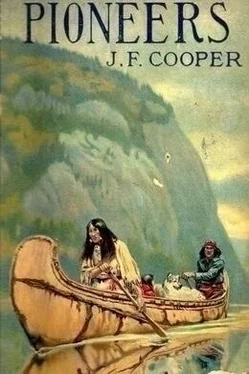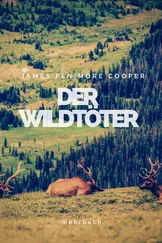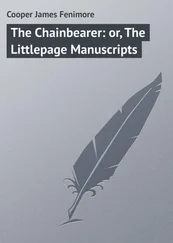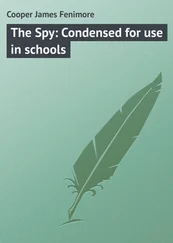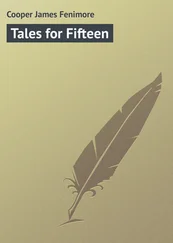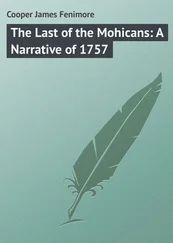It was the vastness of the view, the nearly unbroken surface of verdure, that contained the principle of grandeur. The beauty was to be traced in the delicate tints, relieved by graduations of light and shade; while the solemn repose induced the feeling allied to awe.
"Uncle," said the wondering, but pleased girl, addressing her male companion, whose arm she rather touched than leaned on, to steady her own light but firm footing, "this is like a view of the ocean you so much love!"
"So much for ignorance, and a girl's fancy, Magnet,"—a term of affection the sailor often used in allusion to his niece's personal attractions; "no one but a child would think of likening this handful of leaves to a look at the real Atlantic. You might seize all these tree–tops to Neptune's jacket, and they would make no more than a nosegay for his bosom."
"More fanciful than true, I think, uncle. Look thither; it must be miles on miles, and yet we see nothing but leaves! what could one behold, if looking at the ocean?"
"More!" returned the uncle, giving an impatient gesture with the elbow the other touched, for his arms were crossed, and the hands were thrust into the bosom of a vest of red cloth, a fashion of the times,—"more, Magnet! say, rather, what less? Where are your combing seas, your blue water, your rollers, your breakers, your whales, or your waterspouts, and your endless motion, in this bit of a forest, child?"
"And where are your tree–tops, your solemn silence, your fragrant leaves, and your beautiful green, uncle, on the ocean?"
"Tut, Magnet! if you understood the thing, you would know that green water is a sailor's bane. He scarcely relishes a greenhorn less."
"But green trees are a different thing. Hist! that sound is the air breathing among the leaves!"
"You should hear a nor–wester breathe, girl, if you fancy wind aloft. Now, where are your gales, and hurricanes, and trades, and levanters, and such like incidents, in this bit of a forest? And what fishes have you swimming beneath yonder tame surface?"
"That there have been tempests here, these signs around us plainly show; and beasts, if not fishes, are beneath those leaves."
"I do not know that," returned the uncle, with a sailor's dogmatism. "They told us many stories at Albany of the wild animals we should fall in with, and yet we have seen nothing to frighten a seal. I doubt if any of your inland animals will compare with a low latitude shark."
"See!" exclaimed the niece, who was more occupied with the sublimity and beauty of the "boundless wood" than with her uncle's arguments; "yonder is a smoke curling over the tops of the trees—can it come from a house?"
"Ay, ay; there is a look of humanity in that smoke," returned the old seaman, "which is worth a thousand trees. I must show it to Arrowhead, who may be running past a port without knowing it. It is probable there is a caboose where there is a smoke."
As he concluded, the uncle drew a hand from his bosom, touched the male Indian, who was standing near him, lightly on the shoulder, and pointed out a thin line of vapor which was stealing slowly out of the wilderness of leaves, at a distance of about a mile, and was diffusing itself in almost imperceptible threads of humidity in the quivering atmosphere. The Tuscarora was one of those noble–looking warriors oftener met with among the aborigines of this continent a century since than to–day; and, while he had mingled sufficiently with the colonists to be familiar with their habits and even with their language, he had lost little, if any, of the wild grandeur and simple dignity of a chief. Between him and the old seaman the intercourse had been friendly, but distant; for the Indian had been too much accustomed to mingle with the officers of the different military posts he had frequented not to understand that his present companion was only a subordinate. So imposing, indeed, had been the quiet superiority of the Tuscarora's reserve, that Charles Cap, for so was the seaman named, in his most dogmatical or facetious moments, had not ventured on familiarity in an intercourse which had now lasted more than a week. The sight of the curling smoke, however, had struck the latter like the sudden appearance of a sail at sea; and, for the first time since they met, he ventured to touch the warrior, as has been related.
The quick eye of the Tuscarora instantly caught a sight of the smoke; and for full a minute he stood, slightly raised on tiptoe, with distended nostrils, like the buck that scents a taint in the air, and a gaze as riveted as that of the trained pointer while he waits his master's aim. Then, falling back on his feet, a low exclamation, in the soft tones that form so singular a contrast to its harsher cries in the Indian warrior's voice, was barely audible; otherwise, he was undisturbed. His countenance was calm, and his quick, dark, eagle eye moved over the leafy panorama, as if to take in at a glance every circumstance that might enlighten his mind. That the long journey they had attempted to make through a broad belt of wilderness was necessarily attended with danger, both uncle and niece well knew; though neither could at once determine whether the sign that others were in their vicinity was the harbinger of good or evil.
"There must be Oneidas or Tuscaroras near us, Arrowhead," said Cap, addressing his Indian companion by his conventional English name; "will it not be well to join company with them, and get a comfortable berth for the night in their wigwam?"
"No wigwam there," Arrowhead answered in his unmoved manner—"too much tree."
"But Indians must be there; perhaps some old mess–mates of your own, Master Arrowhead."
"No Tuscarora—no Oneida—no Mohawk—pale–face fire."
"The devil it is? Well, Magnet, this surpasses a seaman's philosophy: we old sea–dogs can tell a lubber's nest from a mate's hammock; but I do not think the oldest admiral in his Majesty's fleet can tell a king's smoke from a collier's."
The idea that human beings were in their vicinity, in that ocean of wilderness, had deepened the flush on the blooming cheek and brightened the eye of the fair creature at his side; but she soon turned with a look of surprise to her relative, and said hesitatingly, for both had often admired the Tuscarora's knowledge, or, we might almost say, instinct,—
"A pale–face's fire! Surely, uncle, he cannot know that ?"
"Ten days since, child, I would have sworn to it; but now I hardly know what to believe. May I take the liberty of asking, Arrowhead, why you fancy that smoke, now, a pale–face's smoke, and not a red–skin's?"
"Wet wood," returned the warrior, with the calmness with which the pedagogue might point out an arithmetical demonstration to his puzzled pupil. "Much wet—much smoke; much water—black smoke."
"But, begging your pardon, Master Arrowhead, the smoke is not black, nor is there much of it. To my eye, now, it is as light and fanciful a smoke as ever rose from a captain's tea–kettle, when nothing was left to make the fire but a few chips from the dunnage."
"Too much water," returned Arrowhead, with a slight nod of the head; "Tuscarora too cunning to make fire with water! Pale–face too much book, and burn anything; much book, little know."
"Well, that's reasonable, I allow," said Cap, who was no devotee of learning: "he means that as a hit at your reading, Magnet; for the chief has sensible notions of things in his own way. How far, now, Arrowhead, do you make us, by your calculation, from the bit of a pond that you call the Great Lake, and towards which we have been so many days shaping our course?"
The Tuscarora looked at the seaman with quiet superiority as he answered, "Ontario, like heaven; one sun, and the great traveller will know it."
"Well, I have been a great traveller, I cannot deny; but of all my v'y'ges this has been the longest, the least profitable, and the farthest inland. If this body of fresh water is so nigh, Arrowhead, and so large, one might think a pair of good eyes would find it out; for apparently everything within thirty miles is to be seen from this lookout."
Читать дальше
